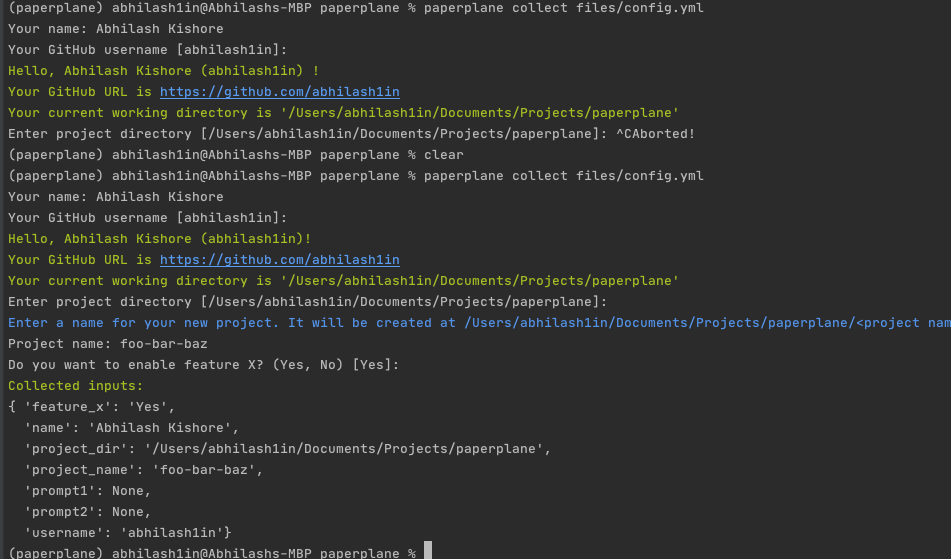Paperplane allows you to build interactive CLIs straight from a configuration file (or a Python dict) without having to write your own code for I/O.
Paperplane orchestrates I/O operations by delegating work to different backends. Supported backends:
- click
- More backends coming soon!
Currently supports:
- Reading an int, string, boolean, one-of-many (choice) inputs.
- The
clickintegration backend automatically callsclick.prompt()
- The
- Display a styled output (bold, foreground color, background color, etc)
- The
clickintegration backend automatically callsclick.secho()
- The
The I/O order and parameters (prompt, data type, available choices, default, etc) can be provided in the following formats:
- YAML
- JSON
- Python dictionary
See Getting Started for more info!
Assuming you have Python (>= 3.6), run:
pip install paperplane
Preliminary documentation is available at paperplane.readthedocs.io.
Detailed documentation coming soon!
- Collect interactive inputs and display styled output text based on simple configurations.
- Dynamic defaults and prompts (the question/message shown to the user) via macros.
- Use the value from one input to calculate the default value for subsequent inputs.
- For example, collect a
usernameinput and usehttps://github.com/<io:username>to auto-compute the default value for the subsequentgithub_urlinput.
- For example, collect a
- Use the
<cwd>macro to get the current working directory - Use the
<env:NAME>macro to fetch the value for an environment variable.- Using the macro
<env:NAME1,NAME2>will fetch the first available environment variable. Useful if, for example, the environment variable names are different on Windows and Linux. Or simply, if you're unsure about which of them will be set.
- Using the macro
- Use the value from one input to calculate the default value for subsequent inputs.
See the example config.yml below for more awesome features!
Paperplane has a convenient paperplane collect CONFIG_FILE command that lets you run and test your config file. It triggers I/O operations based on the provided parameters and dumps the collected information to your terminal (Python dict format by default or alternatively, JSON) for debugging/verifying.
For usage inside a Python script, see here.
To get started, create a new YAML configuration file as follows:
config.yml
backend: click
io:
- name:
type: str
prompt: Your name
- username:
type: str
prompt: Your GitHub username
default: <env:USER,USERNAME>
- prompt1:
type: echo
prompt: |-
Hello, <io:name> (<io:username>)!
Your GitHub URL is https://github.com/<io:username>
Your current working directory is '<cwd>'
fg: green
- project_dir:
type: str
prompt: Enter project directory
default: <cwd>
- prompt2:
type: echo
prompt: Enter a name for your new project. It will be created at <io:project_dir>/<project name>
fg: blue
- project_name:
type: str
prompt: Project name
- feature_x:
type: choice
prompt: Do you want to enable feature X?
choices:
- 'Yes'
- 'No'
default: 'Yes'To run and trigger I/O operations:
paperplane collect /path/to/config.yml
If you want a JSON output (instead of the default Python dict dump):
paperplane collect /path/to/config.yml --json-out
If you have an input JSON config file instead of YAML:
paperplane collect /path/to/config.json --format=json
If you want DEBUG level logs:
paperplane --debug collect /path/to/config.yml
To see all available options:
paparplane --help
paparplane collect --help
from paperplane import parse_and_execute
config = {
'backend': 'click',
'io': [{
'name': {
'type': 'str',
'prompt': 'Your name'
}
},
{
'username': {
'type': 'str',
'prompt': 'Your GitHub username',
'default': '<env:USER,USERNAME>'
}
},
{
'prompt1': {
'type': 'echo',
'prompt': "Hello, <io:name> (<io:username>)!\nYour GitHub URL is https://github.com/<io:username>\nYour current working directory is '<cwd>'",
'fg': 'green'
}
},
{
'project_dir': {
'type': 'str',
'prompt': 'Enter project directory',
'default': '<cwd>'
}
},
{
'prompt2': {
'type': 'echo',
'prompt': 'Enter a name for your new project. It will be created at <io:project_dir>/<project_name>',
'fg': 'blue',
}
},
{
'project_name': {
'type': 'str',
'prompt': 'Project name'
}
},
{
'feature_x': {
'type': 'choice',
'prompt': 'Do you want to enable feature X?',
'choices': ['Yes', 'No'],
'default': 'Yes',
}
}
]
}
values = parse_and_execute(config)
# Do your own stuff with the collected values
print(values)- Tests
- Input validators
- Lazy Jinja2 template rendering in YAML config
